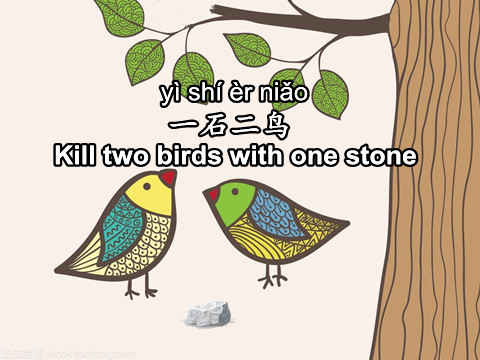Copy link succeeded! Now can share to friends.
Have you ever seen a coffee mug that serves as a snack holder? How about a food basket that can also reheat food? Perhaps a phone case that can also be a wallet?
In our day and age, efficiency is our friend. People love convenience. We even pay more money for multifunctional things in our lives. Often, when we see something that has two functions, we always narrate the Chinese idiom “hitting two birds in one stone” 一石二鸟 ( yì shí èr niǎo).
However, what does this idiom truly means? Does it only apply to the literal aspect of things? Or perhaps it has symbolic and philosophical meaning too? That’s what we shall explore today. The different perspectives on the meaning of the idiom 一石二鸟 ( yì shí èr niǎo); roughly translates into “Hitting two birds in one stone.”

The central thought of this idiom relies on the premise of two things caught or solved using only one course of action. After all, it is physically impossible to kill two birds with one stone unless you have vast practical knowledge of physics. Consequently, “kill two birds with one stone,” is to solve a problem or create two different outcomes from a single course of action.
Nonetheless, we can further explore this idiom by looking into two of its meanings: literal and philosophical.
The literal meaning of the idiom is simple. It means resolving two things using only one action. In ancient times, agriculture played a significant role in their lives. Consequently, when they use a device that can gather water and serve as a carrying tool, they will say, “this tool is incredibly efficient, it’s like hitting two birds in one stone.” That is its literal meaning. The practical application of doing two tasks at once.
If the literal meaning of this idiom means more harvest or more tasks done, its philosophical implication is quite similar. However, it functions in a different realm.
The philosophical meaning translates into a person having a skill that does two things at once. They can do two tasks using one task’s worth of energy. Additionally, they can do it under the same time and condition. When this phenomenon occurs, we say that the person “can hit two birds at the same time.”
During the Southern and Northern Dynasties, during the reign of Emperor Xuan of the Northern Zhou Dynasty, there was a chief of the Turkic people 突厥 (Tū Jué) named Shetu 摄图 (Shè tú).
She Tu has always admired the dignity of the Han family. Consequently, he asked Emperor Xuan for intermarriage. The emperor agreed. Emperor Xuan sent Zhangsun Sheng to escort the princess to Tujue 突厥 (Tū Jué) to marry Shetu. The marriage was a success. They were kind to each other and often hunted together.
One day, they suddenly saw two vultures fighting in the sky. Shetu 摄图 (Shè tú) asked Zhangsun Sheng长孙晟 ( zhǎng Sūnshèng) , “Can you shoot them down?” And hand him two arrows. Zhangsun Sheng 长孙晟 ( zhǎng sūn shèng) rushed to raise the bow. As he pulled the string, he aimed toward the vultures. When the timing was right, Sheng let go of the arrow that made a sharp “swoosh” sound in the air. Shockingly, the arrow pierced through the two eagles simultaneously. According to this allusion, people deduce the strategy of “killing two birds with one stone”. Later, in real life, people often use the metaphor of “killing two birds with one stone一石二鸟 ( yì shí èr niǎo) ” to achieve two achievements by doing one thing, which means “killing two birds with one stone一石二鸟 ( yì shí èr niǎo).”
The synonyms for this idiom have “一箭双雕 (yí jiàn shuāng diāo), ” and “一举两得 (yì jǔ liǎng dé) .” Both idioms function on the same premise and embody similar thoughts.
一石二鸟 (yì shí èr niǎo): Kill two birds with one stone
石 (shí): the second tone, stone, rock, mineral, rad
鸟 (niǎo): the third tone, bird, KangXi radical
For example
Bù tóng de shí tou zài yáng guāng zhào shè xià fā chū bù óng de sè cǎi .
不 同 的 石 头 在 阳 光 照 射 下发 出 不 同 的 色 彩。
Different stones glowed different colors in the sunlight.
Wǒ xǐ huān shōu jí gè zhǒng gè yàng de shí tou.
我 喜 欢 收 集各 种 各 样 的 石 头。
I like to collect all kinds of stones.
Wǒ xǐ huān niǎo yǔ huā xiāng de huán jìng .
我 喜 欢 鸟 语 花 香 的 环 境 。
I like the environment with birds chirping and the fragrance of flowers.
Niǎo ér de jiào shēng shí fèn qīng cuì yuè ěr .
鸟 儿 的 叫 声 十 分 清 脆 悦 耳。
The song of the birds is very clear and sweet.
Your first 1-on-1 Chinese lesson offer